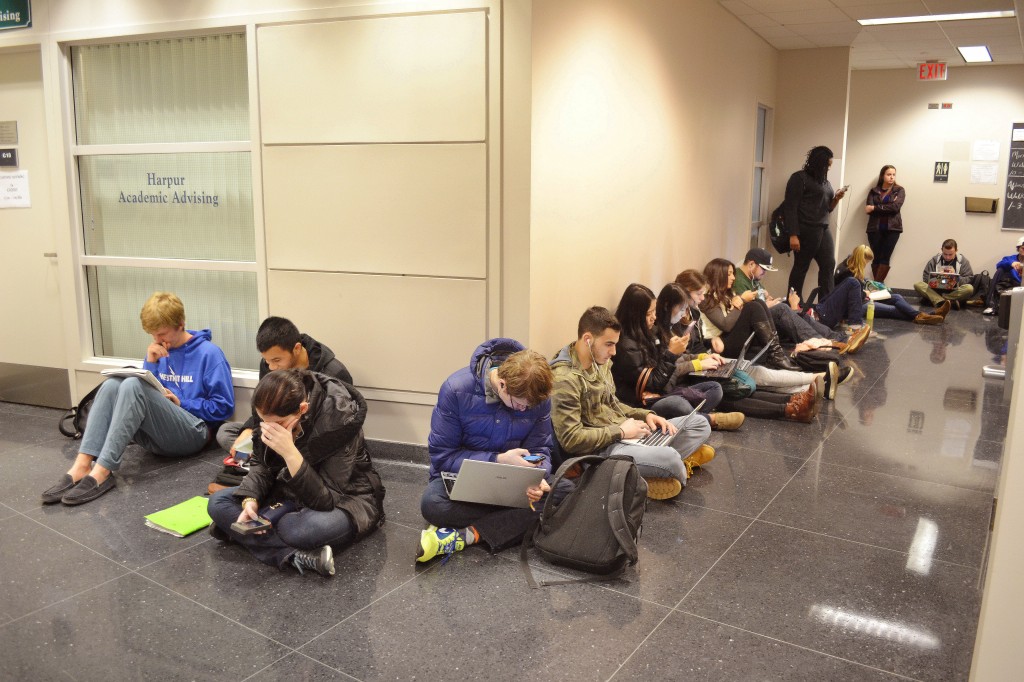
Brandon Berletti showed up to Harpur’s Academic Advising an hour before walk-ins started, but he was still fourth in line to see an adviser. Advising appointments are booked through Thanksgiving, leaving students in competition for walk-in slots to discuss scheduling and other concerns.
“I know it’s a busy time, but there seems to be some sort of dysfunction,” said Berletti, an undeclared sophomore. “It makes things difficult; it makes things stressful.”
In some ways, Berletti is right; Harpur’s advising staff is currently only half of what it usually is. After three advisers took jobs elsewhere and one left on maternity leave, the advising center only has four of its original eight staff members.
Harpur College currently boasts 8,924 students, which results in one adviser for every 2,231 students. Walk-ins are scheduled Monday through Friday, but the advisers can only accommodate about 40 students a day.
Jill Seymour, the associate director of Harpur Advising, said that despite this setback, the advising staff has been doing the best they can.
“It has been a crazy semester but I think it has proven our mettle,” Seymour said. “The students who come to our office sometimes have to wait a few days to see an adviser, so we really appreciate the students understanding that this is a crazy time for us.”
According to Seymour, the national average for student to adviser ratio is 450 to 1. She said that this discrepancy isn’t good, but with new hires throughout the year, her offices hope to be up to 12 advisers in the spring — tripling what it currently has.
“There is no way you can do the job that you want to do with that kind of student to adviser ratio,” Seymour said. “I think the administration has recognized that, so I think that they’re trying to bring our student-to-adviser ratio more on line with what the national average is.”
Four newly hired advisers are currently being trained and will start seeing students by the end of the week. Greg Nolan is coming from Penn State where he was an adviser, Rachael Perry is coming from Keuka College where she was an adviser, Lucas Pint is a Binghamton University alumnus and Jenna Whittaker is coming from Indiana University, Bloomington.
According to Nolan, the addition of new advisers does more than just add more staff — it also gives students a choice.
“Binghamton has the philosophy of choosing your own adviser, so it gives students more of an option as to explore other advisers, see different styles, see who they want to meet with,” Nolan said.
Harpur also offers peer advising, with students who are trained to help with scheduling, degree works and requirements readily available. Peer advising is located right next to Harpur Advising in Academic B.
Benjamin Yee, a sophomore majoring in biology, was sent to peer advising, but said that it was only a partial fix.
“They are doing an adequate job in terms of having peer advisers ready for you, but there’s only so much they can do,” Yee said.
Upperclassmen like Mohamed Bah, a senior majoring in economics, have had difficulty planning their schedule to fit their final requirements. There are just one or two advisers on walk-in duty at all times while the others are doing appointments or administrative duties.
“There is a huge amount of students and they seemed to be understaffed, and they definitely have to do something about it,” Bah said. “It took me literally three days to speak to someone; it’s terrible. It does not do any justice to Harpur students.”
Jeremy Min, a resident assistant in Dickinson Community and a senior double-majoring in history and political science, said that his residents turned to him because they could not get professional help. He said that having to plan his schedule while also helping others was weighing him down.
“I have most of my classes in the morning and lunch time, that’s the time people line up to get a spot to talk to them, but by the time I end my class and go there, there is no spots, and it’s really pointless,” Min said. “I was always frustrated so I had to actually skip class to get to the advising.”
Berletti, like many students, understands the problems Harpur Advising is facing, but he says it is still frustrating.
“I know it’s a busy time,” Berletti said. “But from an outside perspective, when you’re dealing with an institution with 15,000 kids, I think it should be handled a little more efficiently.”


